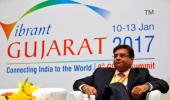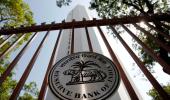'India's economic fundamentals are much too strong to be affected by his resignation,' says B S Raghavan.

All the three principal actors in the unfolding scene in the Reserve Bank of India -- outgoing Governor Urjit Patel, Finance Minister Arun Jaitley and Prime Minister Narendra Damodardas Modi -- have kept up appearances and put out dignified but conventionally worded statements as a sequel to Dr Patel's decision to resign.
Dr Patel has cited personal reasons, leaving the nation puzzled as to how they became so very compelling and emergent as to call for an apparently abrupt resignation 'effective immediately'.
The other two -- the finance minister and the prime minister -- have used honeyed words to pay gracious tributes to the great services rendered by Dr Patel and how he will be missed.
Jaitley has gone a little further and recalled how delightful his discussions with Dr Patel were and how impressed he was by his scholarship.
So far, so good although the cynical might say that they hoped with their dulcet tones to predispose Dr Patel not to embarrass the government, especially with the Lok Sabha election round the corner, with any castigation of the government for making his continuance on the job impossible.
Dr Raghuram Rajan, Dr Patel's immediate predecessor, for his part, has indulged in his usual platitudinous but largely puerile comments on the resignation beginning from his lofty 'All (120 crore?) Indians should be concerned'.
Pulls and pressures were always inherent in the governor's job since the establishment of the RBI in 1935 on the avoidable date of April 1, pursuant to the Reserve Bank of India Act, 1934.
The Act limits the function of the RBI to '...regulate the issue of Bank notes and keeping of reserves with a view to securing monetary stability in India and generally to operate the currency and credit system of the country to its advantage.'
It is a constricted role without any mandate entrusting it in explicit terms with responsibilities (other than issuing and administering the circulation of the currency) which are commonly assumed to fall within the purview of central banks, such as, formulating and implementing monetary policy; maintaining payment and settlement system, managing foreign reserves; acting as banker to the government, and being a player on the international financial stage.
This is unlike the US Act of 1913 under which the Federal Reserve enjoys a comprehensive mandate to 'maintain long run growth of the monetary and credit aggregates commensurate with the economy's long run potential to increase production, so as to promote effectively the goals of maximum employment, stable prices, and moderate long-term interest rates,' besides performing other familiar services such as 'furnishing' an elastic currency, rediscounting commercial paper, and establishing an effective supervision of the country's banking system.
After Independence, with the nationalisation of the RBI in 1948, followed by the adoption of the new Constitution in 1949, the emergence of India as a Republic in 1950, and the ushering in of parliamentary system of democracy, the functions of the RBI could not escape spilling over into areas beyond what were strictly pertaining to a central bank.
Thus, the RBI, in addition to looking after the monetary part of the economy, regulating and supervising the financial system, managing the foreign exchange and being the lender of the last resort, had perforce to undertake a number of developmental and promotional activities aimed at creating a welfare State.
In such a scenario, it was natural for governments of whatever political complexion, answerable and accountable to the people and Constitutionally bound to go to them for electoral endorsement every five years, to expect the RBI to help with policies and actions facilitating credit flows to priority sectors or ensuring overall economic growth.
The bottom line is that in a parliamentary democracy, every branch of government and every institution or agency is subject to checks and balances, and certainly an institution in the monetary and fiscal domain cannot claim iron-clad autonomy disregarding the compulsions on elected governments and function totally insulated and isolated even at the risk of causing economic disruption.
Whoever is the governor of the RBI, it will not do for him to be excessively prickly about governments giving expression to what they regard as policies appropriate to the context to tide over any ticklish financial or economic contingency.
All RBI governors, without exception, have faced this situation and, fortunately, most had the savvy and the maturity to iron out differences of approaches behind the scenes, maintain smooth relations with the finance minister and his aides, and arrive at mutually acceptable solutions.
Of considerable help in hammering out a consensus has been the high calibre, public-spiritedness and mastery of the complexities and intricacies of the economy of the main actors on both sides.
There can be no doubt that the easy rapport between the two has enabled the central bank to diversify and expand its role.
I suspect that Dr Patel had the defect of his virtue in the sense that his professional expertise and deep scholarship hamstrung him in the exercise of his diplomatic skills with a psychological understanding of cross-functional inter-relationships.
It was the same case with Dr Raghuram Rajan, compounded by his unfamiliarity with the complexities and diversities of India in the current context.
Dr Patel, obviously finding it difficult to cope with the pulls and pressures that were always an inescapable part of his job, came to terms with himself and wisely took his leave, whereas Dr Rajan preferred continuing till the end of his term sniping at the government.
It will be wrong to sensationalise Dr Patel's exit as any great calamity or tragedy. India's economic fundamentals are much too strong to be affected by his resignation.
Colossuses have come and gone, and India has survived. It will surmount this transient episode as well.
Only, the government should choose Dr Patel's successor with due consideration, not only to his academic or professional credentials but to his overall grasp of the imperatives of governance in a raucous democracy such as India's.
B S Raghavan, a retired member of the Indian Administrative Service, has a long record of being a columnist for 30 years writing on public issues of national importance.
He has worked in various capacities in the central and state governments and the United Nations, and headed the National Integration Council Secretariat under Jawaharlal Nehru, Lal Bahadur Shastri and Indira Gandhi as prime ministers.
He was also the chancellor of the Jharkhand ICFAI University.










